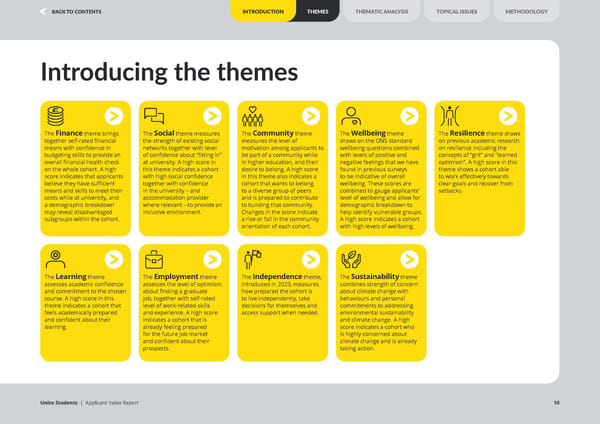Introducing the themes The Finance theme brings together self-rated financial means with confidence in budgeting skills to provide an overall financial health check on the whole cohort. A high score indicates that applicants believe they have sufficient means and skills to meet their costs while at university, and a demographic breakdown may reveal disadvantaged subgroups within the cohort. The Learning theme assesses academic confidence and commitment to the chosen course. A high score in this theme indicates a cohort that feels academically prepared and confident about their learning. The Social theme measures the strength of existing social networks together with level of confidence about “fitting in” at university. A high score in this theme indicates a cohort with high social confidence together with confidence in the university – and accommodation provider where relevant – to provide an inclusive environment. The Employment theme assesses the level of optimism about finding a graduate job, together with self-rated level of work-related skills and experience. A high score indicates a cohort that is already feeling prepared for the future job market and confident about their prospects. The Community theme measures the level of motivation among applicants to be part of a community while in higher education, and their desire to belong. A high score in this theme also indicates a cohort that wants to belong to a diverse group of peers and is prepared to contribute to building that community. Changes in the score indicate a rise or fall in the community orientation of each cohort. The Independence theme, introduced in 2023, measures how prepared the cohort is to live independently, take decisions for themselves and access support when needed. The Wellbeing theme draws on the ONS standard wellbeing questions combined with levels of positive and negative feelings that we have found in previous surveys to be indicative of overall wellbeing. These scores are combined to gauge applicants’ level of wellbeing and allow for demographic breakdown to help identify vulnerable groups. A high score indicates a cohort with high levels of wellbeing. The Sustainability theme combines strength of concern about climate change with behaviours and personal commitments to addressing environmental sustainability and climate change. A high score indicates a cohort who is highly concerned about climate change and is already taking action. The Resilience theme draws on previous academic research on resilience including the concepts of “grit” and “learned optimism”. A high score in this theme shows a cohort able to work effectively towards clear goals and recover from setbacks. THEMES Unite Students | Applicant Index Report 10 INTRODUCTION THEMATIC ANALYSIS METHODOLOGY TOPICAL ISSUES BACK TO CONTENTS
 Unite Students Applicant Index - 2025 Page 9 Page 11
Unite Students Applicant Index - 2025 Page 9 Page 11